Little Miss Marker is an American Pre-Code 1934 comedy-drama film directed by Alexander Hall. It was written by William R. Lipman, Sam Hellman, and Gladys Lehman after a 1932 short story of the same name by Damon Runyon. It stars Shirley Temple, Adolphe Menjou and Dorothy Dell in a story about a young girl held as collateral by gangsters. It was Temple's first starring role in a major motion picture and was crucial to establishing her as a major film star. It was inducted into the National Film Registry by the Library of Congress in 1998 and has been remade several times.

Shirley Temple Black was an American actress, singer, dancer, and diplomat, who was Hollywood's number-one box-office draw as a child actress from 1934 to 1938. Later, she was named United States Ambassador to Ghana and Czechoslovakia, and also served as Chief of Protocol of the United States.
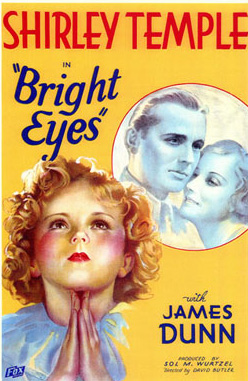
Bright Eyes is a 1934 American comedy drama film directed by David Butler. The screenplay by William Conselman is based on a story by David Butler and Edwin J. Burke.

Shirley Temple (1928–2014) was an American child actress, dancer, and singer who began her film career in 1931, and continued successfully through 1949. When Educational Pictures director Charles Lamont scouted Meglan Dancing School for prospective talent, three-year-old student Temple hid behind the piano. Lamont spotted her and immediately decided she was the one he was looking for. Starting at $10 a day, she was eventually under contract for $50 per film. The production company generated its Baby Burlesks one-reeler film short satires of Hollywood films in 1931–1933, produced by Jack Hays and directed by Lamont. Temple made eight Baby Burlesks films, and 10 other short films, before being signed to star in feature-length motion pictures.
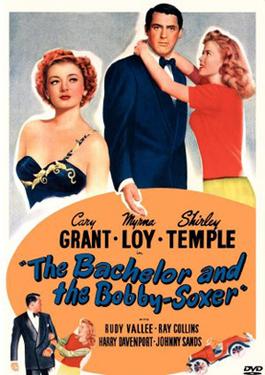
The Bachelor and the Bobby-Soxer is a 1947 American screwball romantic comedy-drama film directed by Irving Reis and written by Sidney Sheldon. The film stars Cary Grant, Myrna Loy and Shirley Temple in a story about a teenager's crush on an older man.

New Friend was the first Singaporean film shot entirely in Singapore and Malaya. It was produced by Nanyang Low Pui-kim's Self-made Motion Picture Company (南洋劉貝錦自製影片公司), in association with Low Pui-kim, who served as the producer and Kwok Chiu-man (郭超文), who was both the director and cinematographer. The film production company originally planned to produce its second film production, silent movie "(行不得也哥哥)", however, as the film production company was closed on 10 May 1927, this film is pending.

Captain January is a 1936 American musical comedy-drama film directed by David Butler. The screenplay by Sam Hellman, Gladys Lehman, and Harry Tugend is based on the 1890 children's book of the same name by Laura E. Richards. The film stars Shirley Temple, Guy Kibbee, and Sara Haden.
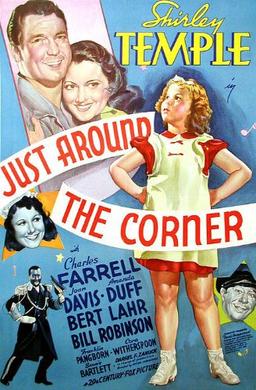
Just Around the Corner is a 1938 American musical comedy film directed by Irving Cummings, and written by Ethel Hill, Darrell Ware and J. P. McEvoy, based on the novel Lucky Penny by Paul Gerard Smith. The film stars Shirley Temple as young Penny Hale, who must cope with the consequences after her architect father is forced by circumstances to accept a job as a janitor. It was the fourth and last cinematic song and dance pairing of Temple and Bill Robinson.
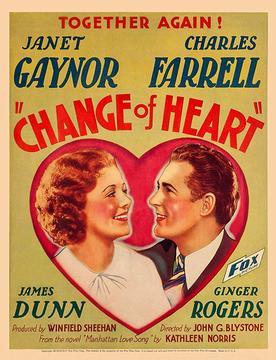
Change of Heart is a 1934 American pre-Code drama film starring Janet Gaynor, Charles Farrell, James Dunn, and Ginger Rogers. The movie, about a quartet of college chums who all move to 1934 New York City, was written by James Gleason and Sonya Levien from Kathleen Norris's novel, Manhattan Love Song and directed by John G. Blystone.
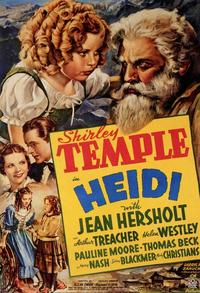
Heidi is a 1937 American musical drama film directed by Allan Dwan and written by Julien Josephson and Walter Ferris, loosely based on Johanna Spyri's 1880 children's book of the same name. The film stars Shirley Temple as the titular orphan, who is taken from her grandfather to live as a companion to Klara, a spoiled, disabled girl. It was a success and Temple enjoyed her third consecutive year as number one box office draw.

Helen Westley was an American character actress of stage and screen.
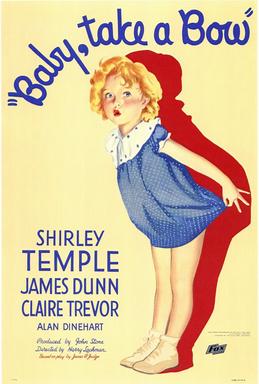
Baby Take a Bow is a 1934 American comedy-drama film directed by Harry Lachman and is one of the earliest Hays code Hollywood films. The screenplay by Philip Klein and Edward E. Paramore Jr. is based on the 1926 play Square Crooks by James P. Judge. Shirley Temple plays the child of an ex-convict trying to make a better life for himself and his family. The film was a commercial success and is critically regarded as pleasant and sentimental. A musical number features Dunn and Temple.

Dimples is a 1936 American musical drama film directed by William A. Seiter. The screenplay was written by Nat Perrin and Arthur Sheekman. The film was panned by the critics. Videocassette and DVD versions of the film were available in 2009.
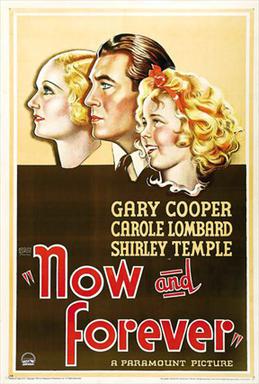
Now and Forever is a 1934 American drama film directed by Henry Hathaway. The screenplay by Vincent Lawrence and Sylvia Thalberg was based on the story "Honor Bright" by Jack Kirkland and Melville Baker. The film stars Gary Cooper, Carole Lombard, and Shirley Temple in a story about a small-time swindler going straight for his child's sake. Temple sang "The World Owes Me a Living". The film was critically well received. Temple adored Cooper, who nicknamed her 'Wigglebritches'. This is the only film in which Lombard and Temple appeared together.
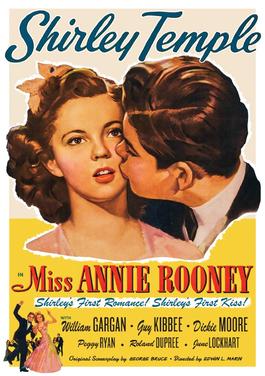
Miss Annie Rooney is a 1942 American drama film directed by Edwin L. Marin. The screenplay by George Bruce has some similarities to the silent film, Little Annie Rooney starring Mary Pickford, but otherwise, the films are unrelated. Miss Annie Rooney is about a teenager from a humble background who falls in love with a rich high school boy. She is snubbed by his social set, but, when her father invents a better rubber synthetic substitute, her prestige rises. Notable as the film in which Shirley Temple received her first on-screen kiss, and Moore said it was his first kiss ever. The film was panned.
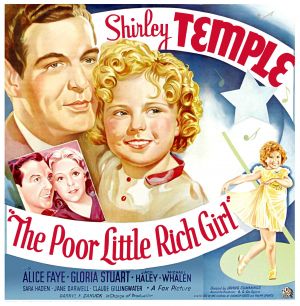
Poor Little Rich Girl, advertised as The Poor Little Rich Girl, is a 1936 American musical film directed by Irving Cummings and starring Shirley Temple, Alice Faye and Jack Haley. The screenplay by Sam Hellman, Gladys Lehman, and Harry Tugend was based on stories by Eleanor Gates and Ralph Spence, and the 1917 Mary Pickford vehicle of the same name. The film focuses on a child (Temple) neglected by her rich and busy father. She meets two vaudeville performers and becomes a radio singing star. The film received a lukewarm critical reception from The New York Times.
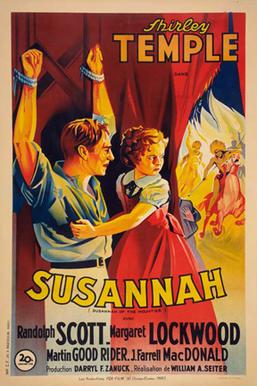
Susannah of the Mounties is a 1939 American Western film directed by William A. Seiter and starring Shirley Temple, Randolph Scott, and Margaret Lockwood. Based on the 1936 novel Susannah of the Mounties by Muriel Denison, the film is about an orphaned survivor of an Indian attack in the Canadian West who is taken in by a Mountie and his girlfriend. Following additional Indian attacks, the Mountie is saved from the stake by the young girl's intervention with the Indian chief.
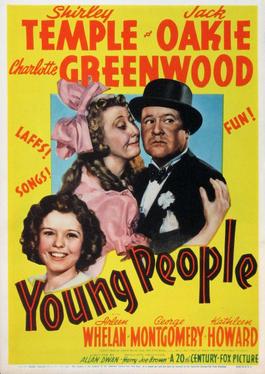
Young People is a 1940 American musical drama film directed by Allan Dwan and starring Shirley Temple and Jack Oakie. This would be Shirley's final film as a child actress.

The Life of the Party is a 1937 American musical comedy film produced by RKO. It was directed by William A. Seiter and starred Joe Penner, Gene Raymond, Parkyakarkus and Harriet Hilliard. It recorded a loss of $111,000.

Miranda Bonansea was an Italian actress and voice actress.



















